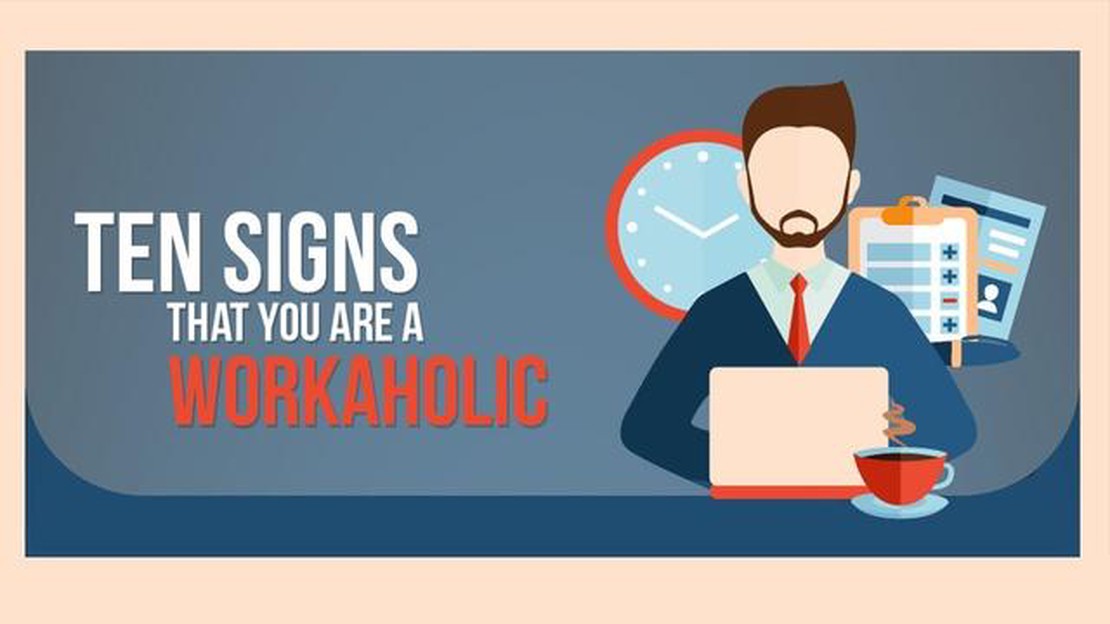Top 5 Car GPS Trackers in 2023 - Find the Best Device for Your Car
5 Best Car GPS Trackers in 2023 GPS trackers have become an essential tool for car owners in recent years. With many vehicle thefts and accidents …
Read Article
Workaholics are people who devote most of their time to work and are highly dependent on it. They are often consumed by their professional activities and tend to neglect their personal life, recreation and other aspects of their life.
However, it is not always easy to determine if you are a workaholic. Some people may consider themselves to be simply very dedicated, but not overworked and find a work-life balance. For others, work can be a source of stress and loss of balance, which can indicate workaholism.
In this article, we will look at a few signs that may indicate that you are a workaholic. These include a constant sense of obligation and an inability to disconnect from work, an excessive preoccupation with work, a disregard for health and personal relationships, and a desire for constant achievement and external recognition.
Fatigue and insomnia are often signs of workaholism. If you are constantly working and not taking time to rest and recuperate, it can take a toll on your physical and mental health. Working continuously without a chance to relax and enjoy life can lead to chronic fatigue, nervous breakdowns and sleep problems.
Often, workaholics prefer to work before bedtime and go to bed late. This can lead to a disruption in the sleep-wake cycle. You may end up having insomnia, difficulty falling asleep, or waking up in the middle of the night with difficulty falling asleep all over again.
Fatigue and insomnia can affect your performance and concentration during the day. You may feel sleepy, tired and irritable. Constant lack of sleep can also cause health problems, such as an increased risk of heart disease, diabetes, and depression.
If you notice that you are constantly showing signs of fatigue and insomnia, it could be a signal that you are suffering from workaholism. Try employing strategies to maintain a healthy sleep pattern, such as setting a strict sleep schedule, avoiding work before bed, and creating a supportive environment for rest.
Some tips for combating fatigue and insomnia:
Fatigue and insomnia can be signs of workaholism, and ignoring them can lead to serious health problems. Be aware of how you feel and find a balance between work and rest to maintain your physical and emotional well-being.
Read Also: The importance of technology in business: why modern tools are essential for success
One sign that you may be a workaholic is a lack of interests outside of work. If you are completely consumed with work tasks and don’t find time or energy for hobbies and pastimes, this could signal a problem.
Here are a few signs that may indicate a lack of interests outside of work:
If you notice these signs, you may want to think about your attitude to work and try to find a work-life balance.
Negative consequences of having no interests outside of work:
Read Also: How to find out a person's name from his photo (2023): the best ways
| Physical health | Psychological health | Social relationships | | Excessive tension, fatigue, insomnia. | Feeling anxious, stressed, depressed. | Alienation from friends and family, deterioration of relationships. |
Be aware of your interests outside of work and try to make time for yourself. Remember that work should not take over your life and it is important to find a balance between work and leisure.
At first glance, work may seem like the most important aspect of life, but being overworked can have a negative impact on your personal life. Workaholics usually suffer from the following problems in their relationships:
Understanding these potential problems and striving to achieve work-life balance are important steps to overcoming the problems associated with workaholism.
If you are constantly working overtime, can’t switch off on weekends, feel guilty and anxious when you are not busy working, you are probably a workaholic.
Some of the signs of a workaholic are: constantly feeling like you are not doing a good enough job, not being able to say “no” when asked to do tasks, always being busy working and not having time for yourself or relaxing.
If you find that work is taking up all your time and energy, negatively affecting your physical and mental health, regularly missing out on important events and relationships in your personal life, then work is probably having a big impact on your personal relationships.
If you have realized that you are a workaholic, it is important to start changing your habits and learn how to rest and relax. Find hobbies and activities that help you take your mind off work. Set boundaries and learn to say “no” so you can have time for yourself and your loved ones.
5 Best Car GPS Trackers in 2023 GPS trackers have become an essential tool for car owners in recent years. With many vehicle thefts and accidents …
Read ArticleEasy steps on how to insert or remove SIM card for Galaxy S9 The Samsung Galaxy S9 is a popular Android smartphone that offers impressive features and …
Read ArticleTroubleshooting Guide: How to Resolve the “Not Registered on Network” Error on Your Android Device If you own an Android device, you may have …
Read ArticleHow To Fix Overwatch 2 Login Error On PS5 | Failed To Connect To Game Server (Updated 2023) Gamers all over the world have been eagerly waiting for …
Read ArticleList of new online casinos in australia Australia is one of the leading countries in the world that is actively developing online casinos and the …
Read Article5 Best Cheap Gaming Monitor in 2023 Gaming is becoming more popular than ever, and having the right gaming monitor can make all the difference in the …
Read Article